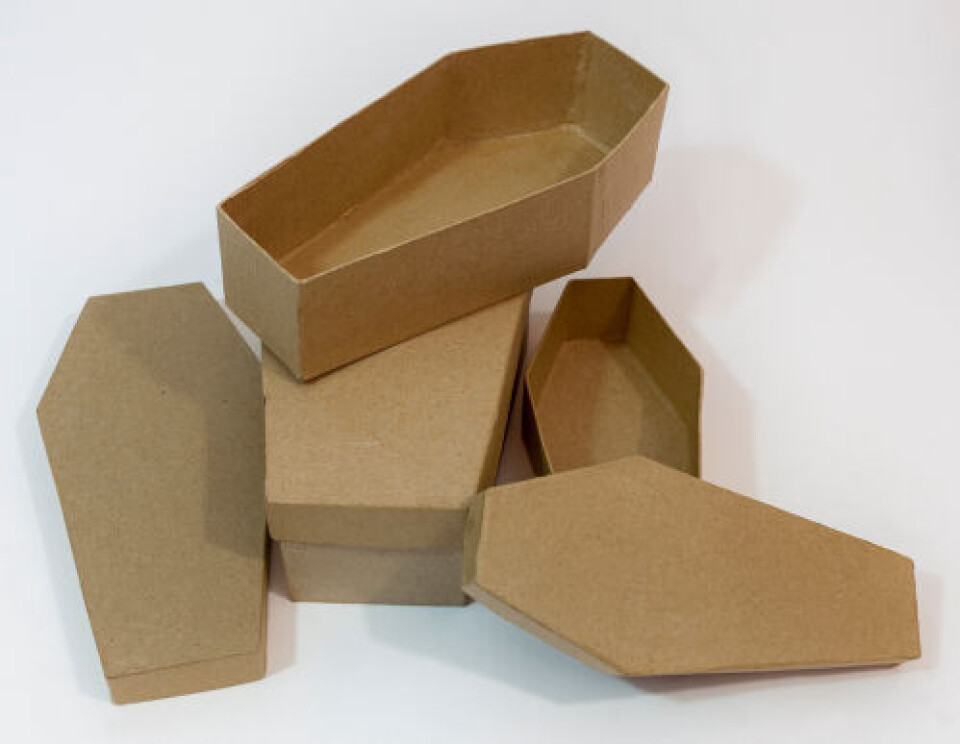-
New agreement to help with home renovations launches in Dordogne
The plan aims to connect citizens with local public renovation services to modernise old housing stock
-
Drivers in France: Look out for this new road sign
The sign aims to encourage more environmentally-friendly driving and road usage practices
-
Funeral companies must pay royalties to play music at services in France
Funeral directors may charge families using music an extra fee or spread costs between all clients
Ecological burials gain popularity in France in face of tradition
Eco-friendly alternatives such as cardboard coffins had been slow to take off in France, where Catholic values have traditionally shaped funeral rites

Grievers are increasingly turning to eco-friendly burials, despite France remaining far behind most western countries in adapting its rituals.
The slow take-off can be explained by the power of ingrained Catholic values and also of funeral lobbyists.
More than 269,000 people were cremated in France in 2020, accounting for 40% of all deaths.
The figure has been increasing constantly since 1975, according to figures from the Association Française d’Information Funéraire (AFIF).
It is far below countries such as the UK (76% in 2018), Sweden (80%) or Japan (99.9%).
It is, however, higher than other countries where Catholicism dominates, such as Italy (20%), Poland (11%) and Brazil (4.5%).
The industry has also expanded its range of materials used for coffins to include, for example, cardboard, which is less expensive and more respectful of the environment.
Read more: What options are there for eco-friendly funerals in France?
Push for France to allow more ‘natural’ burial methods
Some associations are pushing for France to allow more ‘natural’ burial methods, such as human composting.
AFIF president Michel Kawnik said: “There is a growing interest in departing life while being respectful of nature, fitting with evolving mind-sets in terms of the dematerialisation of remembrance.”
Read more: France’s first bicycle-hearse brings ‘softness’ to funerals
The association publishes information on its website in French, English and German.
“The trend has been around for 20 years,” he added, saying lobbies of the funeral industry have been actively undermining any change that would include more ecological solutions, as this would harm profits.
The lobbying is particularly intense against coffins made of cardboard, a new material that is attracting interest in France.
Cardboard coffins: ‘The population is not informed’
Agnès Dione, president of the Association Cercueil Ecologique en Cellulose, who sells cardboard coffins, said: “The population is not informed.
“The information gets lost along the way, somehow.”
She said sales have been plateauing for years at only two coffins a month and she experiences difficulties explaining the advantages to clients.
Both Ms Dione and Mr Kawnik explained to The Connexion some of the false information circulated by lobbyists to denigrate cardboard.
Arguments include cardboard being more pricey, clogging filters during cremation, consuming more gas, or being less biodegradable than wood.
The opposite to every argument is true: cardboard is a third to a quarter as expensive, and requires less than 90 minutes, – an hour less than wooden coffins, on average – during the cremation process.
“If I were to cut down a tree, I would turn it into furniture, rather than a coffin,” said Mr Kawnik.
Biodegradable mushroom coffins
Countries such as Poland, Sweden and the UK have extended even more to include felt, wicker or even biodegradable mushrooms for coffins.
Other techniques have been explored, such as cryomation, where the deceased is plunged in liquid nitrogen and frozen to -196C, aquamation, which uses water rather than fire (chosen recently by Desmond Tutu), or humusation.
Humusation refers to the natural process of a body turning into humus – a component of soil – and involves the burial of a body two metres into the ground among wood shavings and mud, where it is transformed by micro-organisms.
It does not include embalming, nor the use of a coffin.
The phenomenon is gaining ground, particularly as California will become the fifth American state to allow human composting from 2027.
Turn the body into natural compost
It is the only burial technique able to turn the body into natural compost in 12 months, argued Francis Busigny, president of Métamorphose, mourir puis donner la Vie, a Belgian foundation which is vocal about promoting the concept.
“Nothing helps the grieving process more than a growing tree,” he said. It is currently illegal to be buried without a coffin in France.
Funeral services in France cost around €3,350, while cremation costs €3,609 on average, according to figures from insurance company MetLife.
Read more: Are low-cost cremations available in France as they are in the UK?
This does not include the cost of a cemetery plot and depends on a variety of other services and optional extras.
Coffins range from €650 to €3,800, funeral transportation from €250 to €450, and funeral urns from €70 to €380, according to Funecap, a French funerals company.
An forthcoming eco-friendly innovation will see the village of Muttersholtz, in Alsace, inaugurate a memorial forest next year.
This is inspired by similar sites in Germany, where urns can be buried at the base of trees.
Related articles
Coffin materials, abandoned plots: France changes rules on funerals
Can I donate my body to science once I die in France?
Is it legal to bury a pet in your garden in France?
























